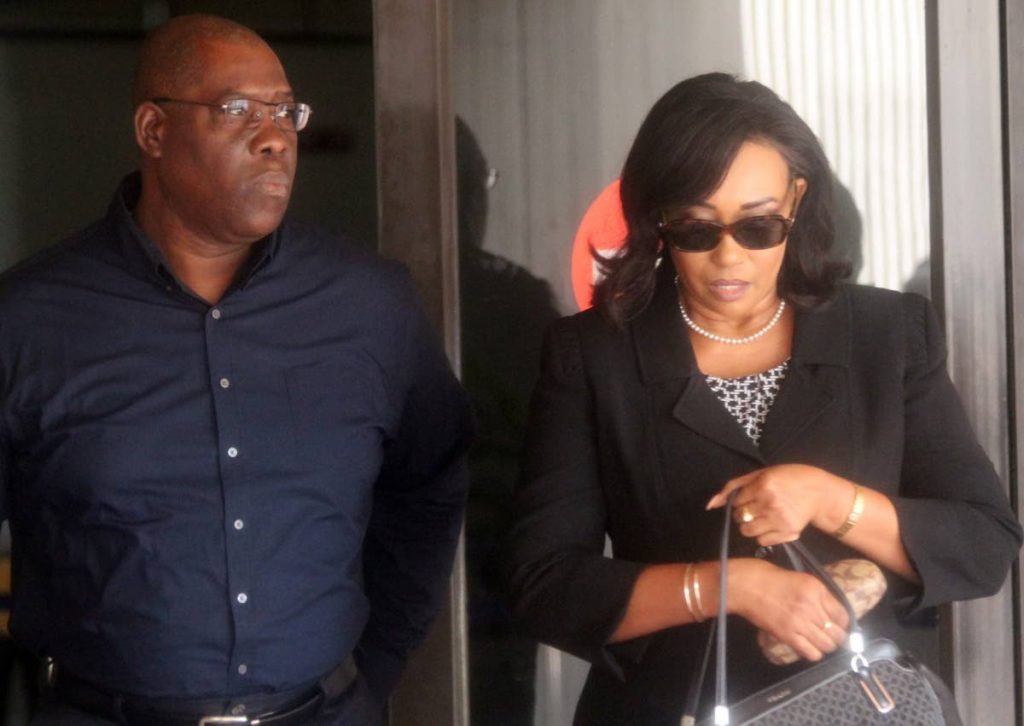EX-CHIEF MAGISTRATE: CJ THREATENED ME

INCONSOLABLE and devastated. Helpless and hopeless.
That’s how former chief magistrate Marcia Ayers-Caesar said she felt when threatened by Chief Justice Ivor Archie that if she did not resign as a high court judge, the Judicial and Legal Service Commission (JLSC) – which he heads – would advise the President to revoke her appointment.
“I could say I lost control of myself. I was feeling helpless and hopeless,” she said as she testified in cross-examination by the JLSC’s lead attorney Russell Martineau, SC, in her judicial review claim against the commission and the Attorney General, which began on Monday.
Told by Martineau that the CJ did no more than ask her to reconsider her position, Ayers-Caesar said the instruction to her was clear: sign the resignation letter. She said she did not object to it because to her it was a "done deal" and she felt she was in a helpless state. "I just had to go along with what the CJ was saying," she said.
Justice David Harris is presiding over the trial, at which Archie is expected to testify on Tuesday. In her lawsuit, the former chief magistrate claims she was pressured by Archie and the JLSC to resign after it was disclosed she left 52 preliminary inquiries unfinished when she took up an appointment as a judge.
Ayers-Caesar was appointed a judge on April 12, 2017, but resigned 15 days later amid public uproar over the unfinished cases in the magistrates court. She is also claiming the JLSC acted unlawfully in seeking her resignation as a judge, it unlawfully procured her resignation and acted unlawfully in treating as effective her consequent purported resignation.
She said she was pressured by the JLSC to resign, in that she was told to sign an already prepared resignation letter or her appointment would be revoked by the President.
Ayers-Caesar, who is asking that her purported resignation be set aside and she be reinstated as a judge, and compensated, said her “resignation as a judge” was orchestrated.
“That’s how I felt,” she said, adding, “it was clear to me that my resignation had already been orchestrated and that this was a done deal. It was orchestrated by the Chief Justice, the president and the JLSC,” she said in response to questions from Martineau.
The then president (Anthony Carmona), she said, felt was “in on it as well because of how things unfolded” as well as the CJ’s former administrative secretary, now High Court Master Sherlanne Pierre since the latter prepared the press release and the resignation letter.
“They procured my resignation in an illegal way,” she said, adding that she was of the belief they were looking at a workable solution to treat with the part-heard cases. “The Chief Justice never invited me to consider any option. He never gave me any option,” she said.
“He did threaten me. He communicated a threat to me and I am here because an injustice was done to me,” she said.
Ayers-Caesar resigned on April 27, after meeting with the CJ. She said that days prior, she and Archie were having discussions on a “workable solution” after it was revealed there were more than the 28 part-heard matters she provided in a list to him days before.
Ayers-Caesar said she made no decision to resign on April 27, nor was she “embarrassed” when the Chief Justice produced a list showing she had 53 part-heard cases.
“I was threatened and told I had to resign or else the president would be advised to revoke my appointment,” she said, denying that she chose to resign because she was embarrassed that the numbers had changed and she was being accused of being selfish.
In defence of the claim, the JLSC has argued that it considered the matter sufficiently serious to trigger a disciplinary enquiry and felt Ayers-Caesar should be given the option of withdrawing from the High Court bench and to return to the magistracy to complete her part-heard cases.
It also contends that she “nodded” and accepted responsibility to resolve her unfinished matters and, in order to do so, tendered her resignation as a judge to return to the magistracy to finish her work.
She denied this, saying when she spoke with the CJ, and told if she did not resign the president would be asked to revoke her appointment, she thought he was representing the true position to her not that the JLSC “would consider” taking a decision and possibly invoke section 137 which sets out the procedure to remove a judge.
She said she was not familiar with section 137 and the protections it would have afforded her since she was only a judge for two weeks.
“Now I know he was misrepresenting the true position to me. I had no need to doubt him,” as she insisted she was threatened to resign. In response to a question by Martineau if her position was that the Chief Justice was a liar and had lied in his affidavit, Ayers-Ceasar said on more than one occasion that the CJ’s account was “not the accurate account.”
She also denied that she mislead the JLSC with the number of cases she left unfinished, saying it was not intentional or deliberate since the list she produced was compiled by the note-taking unit at the magistrates’ court where she presided, 25 as a magistrate and six as chief magistrate.


Comments
"EX-CHIEF MAGISTRATE: CJ THREATENED ME"